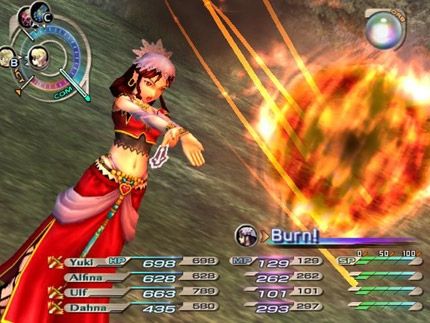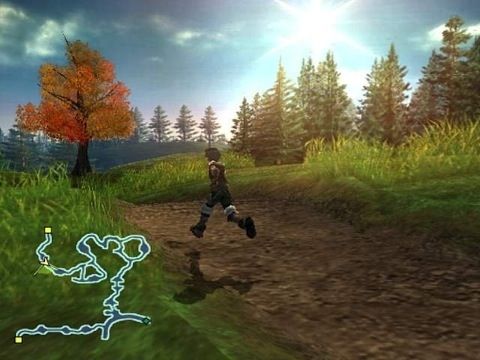Grandia III wasn't the first title in the series I played, but it was the better of the two (the previous one I played being Grandia II). It offers a fairly standard story with mildly unique characters, but offers a lot when it comes to the battle system and the eerily mezmorizing alternate world that proliferates a good part of the narrative.
Naturally, when I think about RPGs I'm passionate about over the course of my gaming history, nearly all of them have a story that draws me in. This one may be the exception. While the story was alright, it is nothing to stand up and scream about. It focuses on Yuki, a teenager with dreams of flying his airplane across the ocean and traveling the world. He and his mother - who live in Anfog Village - end up meeting a mysterious girl named Alfina, and, from then on, are embroiled in a conflict between Guardians of the world and powerful men wanting to draw on their power, something far beyond Yuki's wildest dreams.
 To me, the story is pretty far out there, something we're not altogether unused to as RPG fans. In fact, it involves two different "worlds", if you will. The one our heroes are from and an alternate world that is dying a slow death, called the Verse Realm. These gods - or Guardians - that Alfina can speak to fled the Verse Realm during a war and came to our world. Now trouble is brewing between worlds once more, and Yuki gets in the middle of it all. What makes the story stand out to me, even though it is rather ordinary, is two things - 1) the Verse Realm and 2) how it always manages to stay grounded in "reality".
To me, the story is pretty far out there, something we're not altogether unused to as RPG fans. In fact, it involves two different "worlds", if you will. The one our heroes are from and an alternate world that is dying a slow death, called the Verse Realm. These gods - or Guardians - that Alfina can speak to fled the Verse Realm during a war and came to our world. Now trouble is brewing between worlds once more, and Yuki gets in the middle of it all. What makes the story stand out to me, even though it is rather ordinary, is two things - 1) the Verse Realm and 2) how it always manages to stay grounded in "reality".
Every time our heroes visit the Verse Realm, you're met with quiet beauty, but there's always a hint of sadness wherever you go, especially after you meet Hect, a resident of that world, and get acquainted with the way that she suffers every day. It becomes almost an exercise in controlling your emotions when you visit that world, because it does pull at your heart strings in ways you wouldn't expect. But, while these very surreal situations are happening to our characters, the story usually manages to stay grounded, as well. You visit towns and talk to people in the main world, usually bringing you right back down to Yuki, his simple life and his big dreams. With all this other stuff going on, he still holds true to himself and keeps his goals firmly in front of him.
In addition to the story elements that stood out, I really enjoyed the battle system. But, not just that, the spell effects and the general feeling of power they gave you. At first things might be kind of lacking, but eventually you get powerful spells that tear up the entire battlefield in one huge explosion of awesomeness. In fact, early on the battles seems to take a while, but as you get more characters and more skills, things start progressing at a quicker pace and start getting more lively.
While speaking of the graphical prowess of this title, what first drew me to it was screens of Anfog Village even before the game came out - they were absolutely stunning. While not all areas of the game gave me such an intense desire to actually be there, there are many places that you will see throughout the game where you swear you're seeing some of the best visuals the PS2 can offer.
To date, Grandia III is probably one of the best role-playing experiences I've had on the PS2, and certainly a game to check out for fans of the genre. I would be instantly on board if Square-Enix ever tapped the developers at Game Arts for a current generation incarnation of the franchise.


